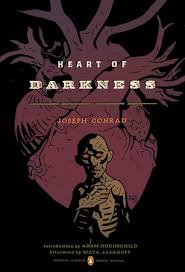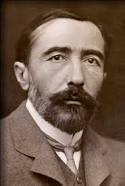Heart of Darkness Page #3
Heart of Darkness is a novella by Polish-British novelist Joseph Conrad, about a voyage up the Congo River into the Congo Free State, in the heart of Africa, by the story's narrator Charles Marlow.
“You understand it was a Continental concern, that Trading society; but I have a lot of relations living on the Continent, because it's cheap and not so nasty as it looks, they say. “I am sorry to own I began to worry them. This was already a fresh departure for me. I was not used to get things that way, you know. I always went my own road and on my own legs where I had a mind to go. I wouldn't have believed it of myself; but, then--you see--I felt somehow I must get there by hook or by crook. So I worried them. The men said 'My dear fellow,' and did nothing. Then--would you believe it?--I tried the women. I, Charlie Marlow, set the women to work--to get a job. Heavens! Well, you see, the notion drove me. I had an aunt, a dear enthusiastic soul. She wrote: 'It will be delightful. I am ready to do anything, anything for you. It is a glorious idea. I know the wife of a very high personage in the Administration, and also a man who has lots of influence with,' etc. She was determined to make no end of fuss to get me appointed skipper of a river steamboat, if such was my fancy. “I got my appointment--of course; and I got it very quick. It appears the Company had received news that one of their captains had been killed in a scuffle with the natives. This was my chance, and it made me the more anxious to go. It was only months and months afterwards, when I made the attempt to recover what was left of the body, that I heard the original quarrel arose from a misunderstanding about some hens. Yes, two black hens. Fresleven--that was the fellow's name, a Dane--thought himself wronged somehow in the bargain, so he went ashore and started to hammer the chief of the village with a stick. Oh, it didn't surprise me in the least to hear this, and at the same time to be told that Fresleven was the gentlest, quietest creature that ever walked on two legs. No doubt he was; but he had been a couple of years already out there engaged in the noble cause, you know, and he probably felt the need at last of asserting his self-respect in some way. Therefore he whacked the old n*gger mercilessly, while a big crowd of his people watched him, thunderstruck, till some man--I was told the chief's son--in desperation at hearing the old chap yell, made a tentative jab with a spear at the white man--and of course it went quite easy between the shoulder-blades. Then the whole population cleared into the forest, expecting all kinds of calamities to happen, while, on the other hand, the steamer Fresleven commanded left also in a bad panic, in charge of the engineer, I believe. Afterwards nobody seemed to trouble much about Fresleven's remains, till I got out and stepped into his shoes. I couldn't let it rest, though; but when an opportunity offered at last to meet my predecessor, the grass growing through his ribs was tall enough to hide his bones. They were all there. The supernatural being had not been touched after he fell. And the village was deserted, the huts gaped black, rotting, all askew within the fallen enclosures. A calamity had come to it, sure enough. The people had vanished. Mad terror had scattered them, men, women, and children, through the bush, and they had never returned. What became of the hens I don't know either. I should think the cause of progress got them, anyhow. However, through this glorious affair I got my appointment, before I had fairly begun to hope for it. “I flew around like mad to get ready, and before forty-eight hours I was crossing the Channel to show myself to my employers, and sign the contract. In a very few hours I arrived in a city that always makes me think of a whited sepulchre. Prejudice no doubt. I had no difficulty in finding the Company's offices. It was the biggest thing in the town, and everybody I met was full of it. They were going to run an over-sea empire, and make no end of coin by trade. “A narrow and deserted street in deep shadow, high houses, innumerable windows with venetian blinds, a dead silence, grass sprouting right and left, immense double doors standing ponderously ajar. I slipped through one of these cracks, went up a swept and ungarnished staircase, as arid as a desert, and opened the first door I came to. Two women, one fat and the other slim, sat on straw-bottomed chairs, knitting black wool. The slim one got up and walked straight at me--still knitting with downcast eyes--and only just as I began to think of getting out of her way, as you would for a somnambulist, stood still, and looked up. Her dress was as plain as an umbrella-cover, and she turned round without a word and preceded me into a waiting-room. I gave my name, and looked about. Deal table in the middle, plain chairs all round the walls, on one end a large shining map, marked with all the colours of a rainbow. There was a vast amount of red--good to see at any time, because one knows that some real work is done in there, a deuce of a lot of blue, a little green, smears of orange, and, on the East Coast, a purple patch, to show where the jolly pioneers of progress drink the jolly lager-beer. However, I wasn't going into any of these. I was going into the yellow. Dead in the centre. And the river was there--fascinating--deadly--like a snake. Ough! A door opened, a white-haired secretarial head, but wearing a compassionate expression, appeared, and a skinny forefinger beckoned me into the sanctuary. Its light was dim, and a heavy writing-desk squatted in the middle. From behind that structure came out an impression of pale plumpness in a frock-coat. The great man himself. He was five feet six, I should judge, and had his grip on the handle-end of ever so many millions. He shook hands, I fancy, murmured vaguely, was satisfied with my French. Bon Voyage. “In about forty-five seconds I found myself again in the waiting-room with the compassionate secretary, who, full of desolation and sympathy, made me sign some document. I believe I undertook amongst other things not to disclose any trade secrets. Well, I am not going to. “I began to feel slightly uneasy. You know I am not used to such ceremonies, and there was something ominous in the atmosphere. It was just as though I had been let into some conspiracy--I don't know--something not quite right; and I was glad to get out. In the outer room the two women knitted black wool feverishly. People were arriving, and the younger one was walking back and forth introducing them. The old one sat on her chair. Her flat cloth slippers were propped up on a foot-warmer, and a cat reposed on her lap. She wore a starched white affair on her head, had a wart on one cheek, and silver-rimmed spectacles hung on the tip of her nose. She glanced at me above the glasses. The swift and indifferent placidity of that look troubled me. Two youths with foolish and cheery countenances were being piloted over, and she threw at them the same quick glance of unconcerned wisdom. She seemed to know all about them and about me, too. An eerie feeling came over me. She seemed uncanny and fateful. Often far away there I thought of these two, guarding the door of Darkness, knitting black wool as for a warm pall, one introducing, introducing continuously to the unknown, the other scrutinizing the cheery and foolish faces with unconcerned old eyes. Ave! Old knitter of black wool. Morituri te salutant. Not many of those she looked at ever saw her again--not half, by a long way.
Translation
Translate and read this book in other languages:
Select another language:
- - Select -
- 简体中文 (Chinese - Simplified)
- 繁體中文 (Chinese - Traditional)
- Español (Spanish)
- Esperanto (Esperanto)
- 日本語 (Japanese)
- Português (Portuguese)
- Deutsch (German)
- العربية (Arabic)
- Français (French)
- Русский (Russian)
- ಕನ್ನಡ (Kannada)
- 한국어 (Korean)
- עברית (Hebrew)
- Gaeilge (Irish)
- Українська (Ukrainian)
- اردو (Urdu)
- Magyar (Hungarian)
- मानक हिन्दी (Hindi)
- Indonesia (Indonesian)
- Italiano (Italian)
- தமிழ் (Tamil)
- Türkçe (Turkish)
- తెలుగు (Telugu)
- ภาษาไทย (Thai)
- Tiếng Việt (Vietnamese)
- Čeština (Czech)
- Polski (Polish)
- Bahasa Indonesia (Indonesian)
- Românește (Romanian)
- Nederlands (Dutch)
- Ελληνικά (Greek)
- Latinum (Latin)
- Svenska (Swedish)
- Dansk (Danish)
- Suomi (Finnish)
- فارسی (Persian)
- ייִדיש (Yiddish)
- հայերեն (Armenian)
- Norsk (Norwegian)
- English (English)
Citation
Use the citation below to add this book to your bibliography:
Style:MLAChicagoAPA
"Heart of Darkness Books." Literature.com. STANDS4 LLC, 2024. Web. 21 Dec. 2024. <https://www.literature.com/book/heart_of_darkness_11>.




Discuss this Heart of Darkness book with the community:
Report Comment
We're doing our best to make sure our content is useful, accurate and safe.
If by any chance you spot an inappropriate comment while navigating through our website please use this form to let us know, and we'll take care of it shortly.
Attachment
You need to be logged in to favorite.
Log In